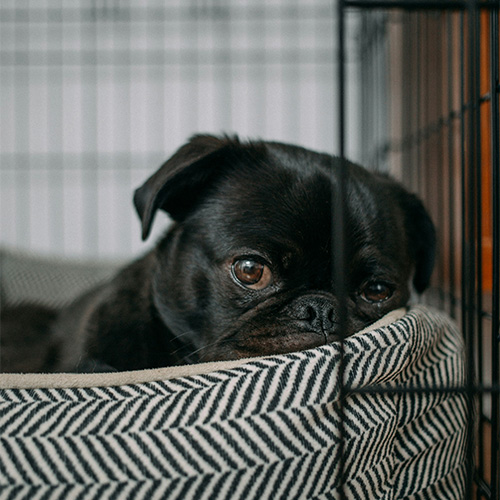


THE HOUND HUB
Unlocking the Benefits: The Importance of Crate Training Your Dog
Tips & Tricks
17 April 2024
Crate training often raises questions and concerns among dog owners. Some see it as confining or even cruel, while others recognize its benefits for both the dog and the owner. In this article, we'll delve into why crate training is not just about confinement but about creating a safe space and fostering positive behaviours for your dog.
Creating a Safe Haven:
Imagine your home as a bustling city and the crate as a cozy apartment—a retreat amidst the chaos. Dogs, by nature, are den animals. A crate simulates a den-like environment, providing them with a sense of security and comfort. It becomes their personal space, where they can relax, sleep, and feel at ease.
Behavioural Benefits:
Beyond being a safe haven, crate training for dogs offers numerous behavioural advantages. Dogs instinctively avoid soiling their living space. Thus, crate training encourages bladder and bowel control, aiding in housebreaking puppies or dogs with incomplete training. Moreover, it prevents destructive behaviours like chewing furniture or rummaging through trash when left unsupervised.
Safety Measures:
Crate training for dogs isn't solely about preventing mischief; it's also about ensuring your dog's safety. When you're unable to supervise your dog, such as during your absence or while cooking dinner, confining them to a crate prevents potential accidents or injuries. It's akin to buckling up a seatbelt for your dog's protection.
Travel Convenience:
Whether it's a road trip or a visit to the veterinarian, crate training for dogs facilitates safe and stress-free travel. Dogs accustomed to their crates find solace in familiar surroundings, alleviating anxiety during journeys. Additionally, crates prevent distractions for the driver and reduce the risk of injury in case of sudden stops or accidents.
Aiding in Transition:
Life is full of changes, and dogs are no strangers to them. Whether moving to a new house, welcoming a new family member, or undergoing medical treatment, crate training for dogs eases transitions. It provides a sense of stability amidst upheaval, helping dogs adapt to new environments or routines with less stress and anxiety.
Positive Reinforcement:
Effective crate training relies on positive reinforcement techniques. Rather than associating the crate with punishment, dogs should perceive it as a rewarding experience. Using treats, toys, and praise, gradually introduce your dog to the crate, making it a place they eagerly retreat to rather than resist.
Avoiding Separation Anxiety:
One of the most significant challenges for dogs is coping with separation from their owners. Crate training for dogs mitigates separation anxiety by offering a secure environment in the owner's absence. It fosters independence and emotional resilience, preventing excessive distress when left alone.
Conclusion:
In essence, crate training is more than just confinement—it's about creating a harmonious environment where dogs thrive physically and emotionally. By providing a safe haven, instilling positive behaviours, ensuring safety, facilitating travel, aiding in transitions, reinforcing positivity, and alleviating separation anxiety, crate training becomes an indispensable tool in nurturing a happy and well-adjusted canine companion. So, embrace crate training not as a constraint, but as a gateway to a stronger bond and a brighter future for you and your dog.
Four Paws Training offer crate training as part of every training programme, for more information please contact Tracy on: 0208 050 8351

For more information on how we can help, please contact us using the form below:
For more information on how we can help, please contact us using the form below:
